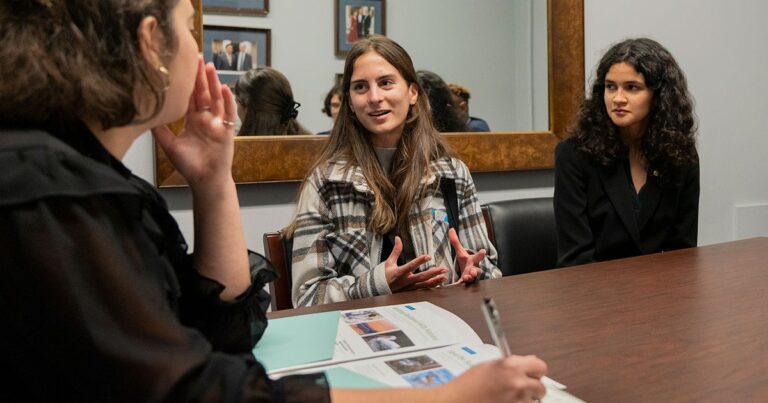Final fall, for the primary time because the Covid-19 pandemic started, I joined Audubon members from throughout the nation in Washington, DC to advocate for seabirds. Along with Audubon workers, a bunch of 27 college students and up to date graduates from 13 totally different Audubon on Campus chapters, in addition to our companions at Bird Alliance of Oregon, converged on Capitol Hill for Audubon’s annual Save the Seabirds Fly-in.
Collectively, we visited 30 congressional workplaces in simply two days, urging our representatives to guard seabirds, fisheries, and folks from local weather change impacts. For some, it was the primary time they’d advocated within the halls of presidency—an expertise that had profound results on how they noticed their work total.
“I by no means thought I may go to DC simply because I joined this group to scrub up our campus,” stated Khadijah Salam, chair of wholesome dwelling for Buddies of the Earth at Claflin College, after I requested her about her expertise on the fly-in. “It sort of put issues in a much bigger perspective.”
Previous to the pandemic, the seabird fly-in was an in-person affair, however for the previous few years the occasion was largely held just about. Employees remarked that the vitality of this in-person occasion was noticeably totally different, and I definitely observed it too. I watched college students from reverse sides of the nation introducing themselves and swapping tales about their campus environmental golf equipment again residence, their enthusiasm plain to see for everybody on the occasion.
“I preferred the sense of group of birders, and it was cool to satisfy different individuals who have alike pursuits,” stated Carissa Pienkowski, founding father of the Audubon chapter at Skidmore Faculty, of the in-person nature of the fly-in.
To arrange us for our day of advocacy within the halls of Congress, Audubon’s Coasts team gave an summary of the insurance policies we’d be advocating for, together with higher fisheries administration and stronger protections for coastal habitats. Seabirds, like pelicans and terns, want each to outlive the challenges that local weather change is throwing at them. These identical points additionally have an effect on folks—we’d like wholesome wetlands, rivers, and coastlines to guard us from rising floods, storms, and sea-level rise. These ecosystems act as our pure infrastructure, offering essential companies to our communities which are simply as important as roads and bridges. When a storm strikes, barrier islands function velocity bumps to decelerate storm surge, and wetlands act as sponges absorbing flood waters.
As we started to organize for our congressional conferences, I may really feel the thrill and anticipation within the room constructing, however many people have been additionally experiencing imposter syndrome.
For instance, Sonia Stan defined that she based a birdwatching membership known as Oviparous on the College of California-San Diego as “a method for me to simply do one thing totally different for a change.” As a pre-med scholar, she stated, “I felt just a little bit unprepared or unfit to be on this crowd, as a result of I anticipated everybody else to be tremendous into authorities and authorized issues, or actually arduous conservationists. And I used to be scared that folks would level me out as an imposter, the odd one on the market. However I received alongside actually, very well with everybody, the entire Audubon workers and college students from totally different universities. So it was a pleasant feeling.”
Salam was additionally anxious about whether or not she belonged, till the group had the distinctive alternative to satisfy with Brenda Mallory, Chair of the White Home Council on Environmental High quality. “In the beginning it felt like all people else who was there was imagined to be there,” Salam stated. “I wasn’t initially certain this was an area I used to be imagined to be in. Everyone felt so certified for what they have been speaking about, and I simply did not really feel certified sufficient. However once we met Brenda Mallory, anyone requested her what was her greatest problem arising in her place, and he or she stated—it sounds cliché—however her greatest enemy is herself, as a result of she by no means noticed in herself what her co-workers and different folks noticed in her.”
Because the fly-in, Reps. Mike Levin, Brian Mast, Suzanne Bonamici, and Jen Kiggans introduced the Resilient Coasts & Estuaries Act, which might tackle many points that the fly-in advocates raised of their congressional conferences. If handed, this invoice will fund the Coastal and Estuarine Land Conservation Program, add 5 new estuaries to the Nationwide Estuarine Analysis Reserve System, and supply essential help for Tribal, state, and native governments to guard susceptible coastal communities and habitats from local weather change.
For lots of the college students I spoke to, the fly-in modified their perspective on authorities and gave them a chance to flex their energy as advocates.
“A number of stuff about authorities and laws appeared actually far out of my attain,” stated Stan. “However after this expertise I spotted it’s surprisingly simple to get entangled in advocacy, which might be very impactful. And you do not have to be in legislation or dedicate your self to lobbying to nonetheless have an effect.”
Pienkowski agreed, including: “It was actually cool to be part of making change, and particularly as a result of that is why I needed to start out the Audubon chapter—to clearly promote conservation of lots of the birds I care about—but in addition make precise change on this planet. That brief journey truthfully made me really feel actually good about beginning the chapter and hopeful for lots of the birds.”

